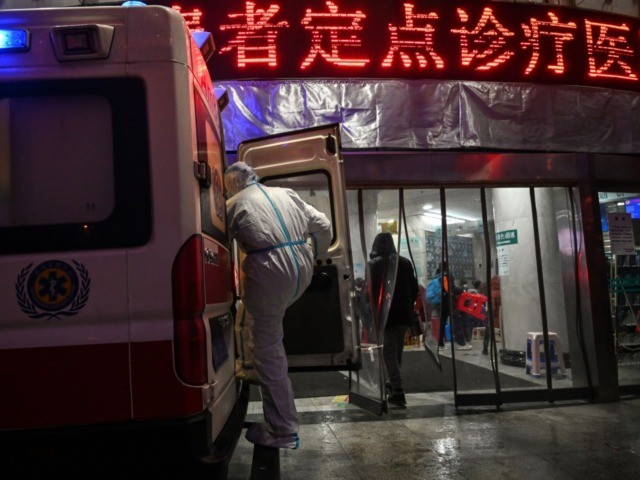The Chinese communist regime announced the death of Peng Yinhua, a 29-year-old doctor from Wuhan, on Friday after the health professional contracted the novel coronavirus that has infected nearly 80,000 people worldwide.
Peng had made headlines in Chinese state media for postponing his wedding to stay in Wuhan and treat patients as the outbreak became an overt pandemic in the city, Hubei’s regional capital and home to 11 million people. His death is extraordinary as most of the upwards of 2,000 people killed by the Wuhan virus are considered either elderly or patients with other chronic diseases.
He joins two other doctors that Beijing claims died of coronavirus: 34-year-old Li Wenliang, famous as one of the eight people arrested in January for posting safety information about the virus on social media, and 51-year-old Liu Zhiming, the director of Wuhan’s central hospital.
Chinese authorities have not provided an explanation for why these young, otherwise healthy men lost their lives while nearly 19,000 people have recovered safely after being diagnosed.
The novel coronavirus is believed to have jumped from animals to humans at a wild meat market in Wuhan in December. Chinese authorities shut the market down on January 1, but did not make the outbreak public until January 20, allowing mass assemblies throughout Wuhan that likely exacerbated the spread of the virus. Chinese officials also failed to tell health workers that a contagious respiratory infection had been identified, so early coronavirus patients were not quarantined for a month or longer.
Wuhan authorities also said that 5 million people left the city before Beijing made the outbreak public, spreading the virus to every province in the nation and a host of nations in Asia, Africa, Europe, the Middle East, and North America.
The coronavirus causes a respiratory infection that triggered fevers, difficulty breathing, pneumonia, and death. Doctors believe that it can spread through viral particles in the air, making it highly contagious.
Chinese state propaganda eulogized Peng as a hero for choosing not to leave Wuhan during the Lunar New Year, which occurred just days after China made the outbreak public, or get married as he had planned at the time. Peng had set his wedding date for February 1. The Chinese state news agency Xinhua lamented that he “never got to send out his wedding invitations, which are still in his office drawer.” Peng specialized in respiratory illnesses and so saw himself as key to helping Wuhan fight the virus.
China Daily, another government outlet, specified that he died of pneumonia after testing positive for the new coronavirus.
#EverydayHero A 29-year-old front line doctor, Peng Yinhua, passed away on Feb 20 in #Wuhan. He had postponed his wedding to fight the novel #coronavirus epidemic. Now he will never see his fiancée in her wedding gown. R.I.P. #COVID19 #China pic.twitter.com/vu9rIJk8OW
— China Daily (@ChinaDaily) February 21, 2020
Peng’s is the most high-profile case of a medical death since Liu Zhiming’s. Liu was a neurologist and in charge of the Wuchang hospital in Wuhan when he died last week. He is believed to be the highest-ranking medical official the coronavirus has killed in China.
Shortly before his death, in early February, authorities revealed that of Li Wenliang. Li had only been identified as one of the victims of Wuhan police censorship shortly before authorities reported his death, then claimed the report was false, only to ultimately confirm it.
Prior to his death, he was one of eight people detained and “handled,” according to Chinese officials, by Wuhan police for spreading “falsehoods” about the virus online. Li had posted in an all-doctors Weibo group that he believed the virus was highly contagious and medical professionals should take care to isolate patients and use precautionary measures, which the government had yet to tell doctors to do. Police detained Li for hours and forced him to sign a humiliating statement vowing to never again “disturb the public order” shortly before he was confirmed to be carrying coronavirus and later died.
China has not made the medical history of any of the three doctors public, suggesting they did not have any chronic conditions that would have worsened the coronavirus infection. This makes them extremely rare cases of young, healthy people dying from the infection.
Li’s death, in particular, prompted widespread anger at the Chinese government, which state media attempted to deflect away from Beijing and towards Wuhan local officials. Growing frustration with widespread city lockdowns and minimal information on how to protect from the virus has resulted in a torrent of criticism of the government online, prompting Beijing to invest in over a thousand censors deployed to Weibo, WeChat, and other government social media to delete posts the government does not approve of.
China is also attempted to generate goodwill from its frustrated people through the alleged construction of nearly two dozen hospitals in Wuhan. Chinese media repeatedly spread propaganda around the construction of one “hospital” in Wuhan in barely a week, but has not allowed international media to observe it. On Friday, Wuhan authorities said they would build another 19 medical facilities.
“Upon their completion, all the makeshift hospitals in Wuhan are expected to offer 30,000 beds on Feb. 25, said Hu Yabo, deputy mayor of Wuhan at a press briefing on epidemic prevention and control,” according to the state-run Global Times newspaper.

COMMENTS
Please let us know if you're having issues with commenting.